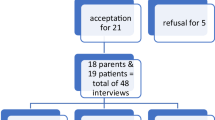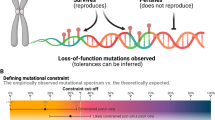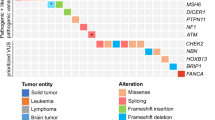Abstract
Presymptomatic testing for hereditary cancer syndromes should involve a considered choice. This may be particularly challenging when testing is undertaken in early adulthood. With the aim of exploring the psychosocial implications of presymptomatic testing for hereditary cancer in young adults and their parents, a cross-sectional survey was designed. Two questionnaires were developed (one for young adults who had considered presymptomatic testing, one for parents). Questionnaires were completed by 152 (65.2%) young adults and 42 (73.7%) parents. Data were analysed using descriptive statistics, inferential testing, and exploratory factor analysis and linear regression analysis. Young adults were told about their potential genetic risk at a mean age of 20 years; in most cases, information was given by a parent, often in an unplanned conversation. Although testing requests were usually made by young adults, the majority of parents felt they had control over the young adult’s decision and all felt their children should be tested. Results suggest that some young adults did not understand the implications of the genetic test but complied with parental pressure. Counselling approaches for presymptomatic testing may require modification both for young adults and their parents. Those offering testing need to be aware of the complex pressures that young adults can experience, which can influence their autonomous choices. It is therefore important to emphasise to both parents and young adults that, although testing can bring benefits in terms of surveillance and prevention, young adults have a choice.
Similar content being viewed by others
Log in or create a free account to read this content
Gain free access to this article, as well as selected content from this journal and more on nature.com
or
References
Evans JP, Skrzynia C, Burke W. The complexities of predictive genetic testing. BMJ. 2001;322:1052–6.
Beery TA, Williams JK. Risk reduction and health promotion behaviors following genetic testing for adult-onset disorders. Genet Test. 2007;11:111–23.
Quaid KA, Sims SL, Swenson MM, et al. Living at risk: concealing risk and preserving hope in Huntington disease. J Genet Couns. 2008;17:117–28.
Baig SS, Strong M, Rosser E, et al. 22 Years of predictive testing for Huntington’s disease: the experience of the UK Huntington’s Prediction Consortium. Eur J Hum Genet. 2016;24:1396–402.
Meissen GJ, Mastromauro CA, Kiely DK, et al. Understanding the decision to take the predictive test for Huntington disease. Am J Med Genet. 1991;39:404–10.
Williams JK, Schutte DL, Evers CA et al. Adults seeking presymptomatic gene testing for Huntington disease. J Nurs Scholarship. 1999; 31:109–14.
Borry P, Stultiens L, Nys H, et al. Presymptomatic and predictive genetic testing in minors: a systematic review of guidelines and position papers. Clin Genet. 2006;70:374–81.
Richards FH. Predictive genetic testing of adolescents for Huntington disease: a question of autonomy and harm. Am J Med Genet Part A. 2008;146A:2443–6.
Duncan RE, Gillam L, Savulescu J, et al. Reply to Richards: ‘Predictive genetic testing of adolescents for Huntington disease: a question of autonomy and harm’. Am J Med Genet Part A. 2008;146A:2447–8.
Borry P, Evers-Kiebooms G, Cornel MC, et al. Genetic testing in asymptomatic minors: background considerations towards ESHG Recommendations. Eur J Hum Genet. 2009;17:711–9.
Rindfuss R. The young adult years: diversity, structural change, and fertility. Demography. 1991;28:493–512.
Patenaude AF, Dorval M, DiGianni LS, et al. Sharing BRCA1/2 test results with first-degree relatives: factors predicting who women tell. J Clin Oncol. 2006;24:700–6.
Bradbury AR, Dignam JJ, Ibe CN, et al. How often do BRCA mutation carriers tell their young children of the family’s risk for cancer? A study of parental disclosure of BRCA mutations to minors and young adults. J Clin Oncol. 2007;25:3705–11.
Van Der Meer LB, Van Duijn E, Wolterbeek R, et al. Adverse childhood experiences of persons at risk for Huntington’s disease or BRCA1/2 hereditary breast/ovarian cancer. Clin Genet. 2012;81:18–23.
Godino L, Turchetti D, Jackson L, et al. Impact of presymptomatic genetic testing on young adults: a systematic review. Eur J Hum Genet. 2016;24:496–503.
Godino L, Jackson L, Turchetti D, et al. Decision making and experiences of young adults undergoing presymptomatic genetic testing for familial cancer: a longitudinal grounded theory study. Eur J Hum Genet. 2018;26:44–53.
Mann CJ. Observational research methods. Research design II: cohort, cross sectional, and case-control studies. Emerg Med J. 2003;20:54–60.
Dillman DA, Smyth JD, Christian LM. Internet, phone, mail, and mixed-mode surveys: the tailored design method. New Jersey: John Wiley & Sons, Inc. 2014.
Gruppo di Lavoro congiunto Istat-FUB. Internet@Italia 2013: La popolazione italiana e l’uso di Internet. Roma: ISTAT-FUB; 2014.
Shiloh S, Avdor O, Goodman RM. Satisfaction with genetic counseling: Dimensions and measurement. Am J Med Genet. 1990;37:522–9.
Bruno M, Tommasi S, Stea B, et al. Awareness of breast cancer genetics and interest in predictive genetic testing: a survey of a southern Italian population. Ann Oncol. 2004;15:I48–54.
Azzalini A. Inferenza statistica : una presentazione basata sul concetto di verosimiglianza. New York: Springer; 2001.
Tercyak KP, Peshkin BN, DeMarco TA, et al. Parent-child factors and their effect on communicating BRCA1/2 test results to children. Patient Educ Couns. 2002;47:145–53.
Kaiser HF. An index of factorial simplicity. Psychometrika. 1974;39:31–6.
Metcalfe A, Plumridge G, Coad J, et al. Parents’ and children’s communication about genetic risk: a qualitative study, learning from families’ experiences. Eur J Hum Genet. 2011;19:640–6.
Metcalfe A, Coad J, Plumridge GM, et al. Family communication between children and their parents about inherited genetic conditions: a meta-synthesis of the research. Eur J Hum Genet. 2008;16:1193–200.
Gaff CL, Lynch E, Spencer L. Predictive testing of eighteen year olds: counseling challenges. J Genet Couns. 2006;15:245–51.
Duncan RE, Gillam L, Savulescu J, et al. ‘Holding your breath’: interviews with young people who have undergone predictive genetic testing for Huntington disease. Am J Med Genet Part A. 2007;143A:1984–9.
Duncan RE, Gillam L, Savulescu J, et al. ‘You’re one of us now’: young people describe their experiences of predictive genetic testing for Huntington disease (HD) and familial adenomatous polyposis (FAP). Am J Med Genet C Semin Med Genet. 2008;148c:47–55.
Duncan RE, Gillam L, Savulescu J et al. The challenge of developmentally appropriate care: predictive genetic testing in young people for familial adenomatous polyposis. Fam Cancer. 2010; 9: 27–35.
Hamilton R, Williams JK, Bowers BJ, et al. Life trajectories, genetic testing, and risk reduction decisions in 18-39 year old women at risk for hereditary breast and ovarian cancer. J Genet Couns. 2009;18:147–59.
Werner-Lin A, Ratner R, Hoskins LM, et al. A survey of genetic counselors about the needs of 18-25 year olds from families with hereditary breast and ovarian cancer syndrome. J Genet Couns. 2015;24:78–87.
Pew Research Center. The boomerang generation: Feeling OK about living with mom and dad. 2012. http://www.pewsocialtrends.org/files/2012/03/PewSocialTrends-2012-BoomerangGeneration.pdf. Accessed 4 Jan 2016.
Pew Research Center. A rising number of young adults live in their parents’ home. 2013. http://www.pewsocialtrends.org/2013/08/01/a-rising-share-of-young-adults-live-in-their-parents-home/. Accessed 4 Jan 2016.
Ferrari G, Rosina A, Sironi E. Beyond good intentions: the decision-making process of leaving the family of origin in Italy. Dondena Work Pap. 2014;60:1–23.
Istat. Giovani.Stat. 2016. http://dati-giovani.istat.it/Index.aspx. Accessed 10 Dec 2016.
Shanahan MJ. Pathways to adulthood in changing societies: variability and mechanisms in life course perspective. Annu Rev Sociol. 2000;26:667–92.
American Society of Human Genetics Board of Directors, American College of Medical Genetics Board of Directors. Points to consider: ethical, legal, and psychosocial implications of genetic testing in children and adolescents. American Society of Human Genetics Board of Directors, American College of Medical Genetics Board of Directors. Am J Hum Genet. 1995;57:1233–41.
Cohen CB. Wrestling with the future: should we test children for adult-onset genetic conditions? Kennedy Inst Ethics J. 1998;8:111–30.
Buchanan A, Brock D. Deciding for others: the ethics of surrogate decision making. Cambridge: Cambridge University Press; 1990.
Guilford PJ. Psychometric methods, 2nd ed. New York : McGraw-Hill; 1954.
Comrey AL, Lee HB. A first course in factor analysis. Psychology Press; 1973.
Gorsuch R. Factor analysis. Philadelphia: WB Saunders; 1974.
Cattell RB. The scientific use of factor analysis in behavioral and life sciences. Boston, MA: Springer; 1978. https://doi.org/10.1007/978-1-4684-2262-7
Hair JF, Anderson RE, Tatham RL, Grablowsky BJ. Multivariate data analysis. Tulsa. 1979.
Acknowledgements
We would like to express our gratitude to the young adults and parents who participated in this study. We also kindly acknowledge all the administrators that give us the permission to post the recruitment messages in their Facebook group, and Twitter sites. LG was supported by the Grant from Regione Emilia-Romagna “Diagnostics advances in hereditary breast cancer (DIANE)” (PRUa1GR-2012-001).
Author information
Authors and Affiliations
Corresponding author
Ethics declarations
Conflict of interest
The authors declare that they have no conflict of interest.
Electronic supplementary material
Rights and permissions
About this article
Cite this article
Godino, L., Turchetti, D., Jackson, L. et al. Presymptomatic genetic testing for hereditary cancer in young adults: a survey of young adults and parents. Eur J Hum Genet 27, 291–299 (2019). https://doi.org/10.1038/s41431-018-0262-8
Received:
Revised:
Accepted:
Published:
Issue date:
DOI: https://doi.org/10.1038/s41431-018-0262-8
This article is cited by
-
Public perspectives on healthcare professional-directed communication of hereditary genetic risks: a mixed-method systematic review
European Journal of Human Genetics (2025)
-
Developing a questionnaire to explore lay people’s preferences for communicating hereditary conditions within families: insights from a cognitive interview study
Journal of Community Genetics (2025)
-
Cascade testing in Italian Hereditary Breast Ovarian Cancer families: a missed opportunity for cancer prevention?
Familial Cancer (2024)
-
Outcomes of support groups for carriers of BRCA 1/2 pathogenic variants and their relatives: a systematic review
European Journal of Human Genetics (2022)
-
Minors at risk of von Hippel-Lindau disease: 10 years’ experience of predictive genetic testing and follow-up adherence
European Journal of Human Genetics (2022)



